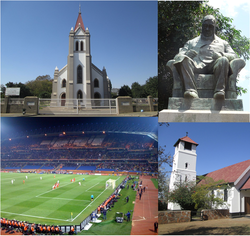Rustenburg, North West
|
Rustenburg City of rest |
|
|---|---|

From top left clockwise: Dutch Reformed Church, Statue of Paul Kruger, Old Anglican Church, Royal Bafokeng Stadium
|
|
|
|
|
| Coordinates: 25°40′S 27°15′E / 25.667°S 27.250°ECoordinates: 25°40′S 27°15′E / 25.667°S 27.250°E | |
| Country | South Africa |
| Province | North West |
| District | Bojanala |
| Municipality | Rustenburg |
| Established | 1851 |
| Area | |
| • Total | 282.42 km2 (109.04 sq mi) |
| Elevation | 1,170 m (3,840 ft) |
| Population (2011) | |
| • Total | 104,612 |
| • Density | 370/km2 (960/sq mi) |
| Racial makeup (2011) | |
| • Black African | 52.8% |
| • Coloured | 2.8% |
| • Indian/Asian | 3.3% |
| • White | 40.4% |
| • Other | 0.6% |
| First languages (2011) | |
| • Afrikaans | 41.2% |
| • Tswana | 27.9% |
| • English | 11.9% |
| • Sotho | 4.0% |
| • Other | 15.0% |
| Postal code (street) | 0300 |
| PO box | 0300 |
| Area code | 014 |
| Website | Rustenburg Local Municipality |
Rustenburg (/ˈrʊstənbʊərx/; Afrikaans pronunciation: [ˈrœstənbœrχ], Afrikaans and Dutch: Town of Rest) is a city situated at the foot of the Magaliesberg mountain range in North West Province of South Africa. It was one of the official host cities of the 2010 FIFA World Cup, being in close proximity to Phokeng, capital of the Royal Bafokeng Nation, where the Royal Bafokeng Stadium is located. The England national football team also used this as their base camp for the tournament.
Before European settlers arrived, the area had been settled by agrarian Setswana speaking tribes for several hundred years after colonising the native pastoralist Khoikhoi people.
Rustenburg's population is primarily Tswana people. Many belong to the Royal Bafokeng Nation, extensive landowners earning royalties from mining operations. The Royal Bafokeng are descendants of Sotho settlers who displaced the local tribes from the region, which they came to call 'place of dew' (Phokeng). In the early 1800s, the Bafokeng and other Tswana communities were conquered in a series of devastating wars launched by an offshoot of the Zulu kingdom, called the Matabele. The Boers had also fought the Zulu and Matabele, and so the Boers and Tswana found in the Matabele a common enemy. The Tswana and Boers planned together and worked toward defeating the Matabele from a Sotho-Tswana kingdom to the south, and together, they defeated the Matebele. As the Boers settled in the area, called their settlement Rustenburg because they had relatively friendly relations with their Bafokeng allies in the area, and after the many violent military conflicts with other African chiefdoms, such as the Matabele, they believed they could rest ("rusten" in Dutch) in this settlement, whose name literally means "Resting Town." Although had already long lived in the area when the Boers arrived, the Bafokeng bought land rights from the Boers, and they purchased their first tracts of land in the late nineteenth and early twentieth century from the colonial rulers, some in exchange for serving in the Boer Wars. Although these land purchases were technically illegal, Paul Kruger, who would become a president of the Transvaal Boer Republic, but was then a veld kornet, was friendly to the Bafokeng and helped arrange many of these purchases.
...
Wikipedia



